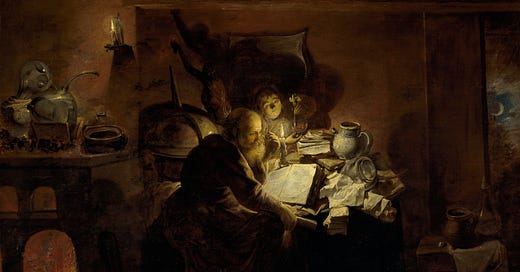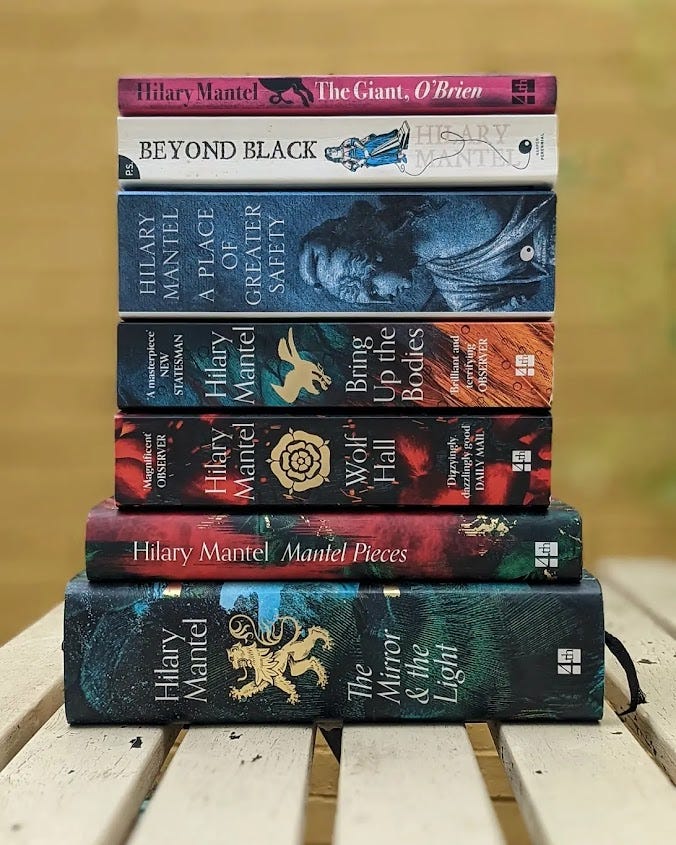The Alchemist in the Archive
Friday Fireside #5 | Remembering Hilary Mantel | Writing between fact and fiction | An invitation
“Some of these things are true and some of them lies. But they are all good stories.”
Hilary Mantel died a year ago today. I can’t remember what I was trying to write when I heard the news. All I have is what I wrote next. Mantel’s books glared at me from their place on the shelves. I considered how her words had made thought and feeling inside me. And this is what I wrote:
These books, they are dangerous. These books are alive. And life is not safe.
If it were, we would not be born, but come dreamed into essence. Sprites in the mist, dancing at dawn, without memories or care.
There would be no last battle in the bedchamber. Blood in the bowl. Lights flashing on the night ward. Cold feet in an empty house.
For good or for ill, some old giant found our thoughts, wandering in a green glade wood. Gathered up in a sack, he hauled us back, to a cave before time, with a fire at its lip.
Here in twilight, firelight and drum, he poured our thoughts slowly in. To bones & flesh, bound in skin. A body new, but already frayed. Broken in the breaking in.
It was the giant that told us stories. And how to speak to the dead. At the back of his cave, water fell beyond black. And ghosts sat playing dice. Painting monsters on the wall.
By morning we were fully made. With breath and pulse, eyes and elbows. Nightmares, dreams. We said farewell.
But a body made, can be unmade. And the ghosts came with us. The monsters too. Those teeth, those claws, flashing in candlelight, slipping from the rock.
So we're lost in the woods and we're moving fast. We've stories to tell, but no time to tell them. Ghosts to outrun, but the day's running on.
We come to a river. And open sky.
Above, birds scatter and strange silhouettes. Gods, giant moths — men with arms raised and feathered, flying to the sun. Climbing ladders to heaven.
We want to get up and follow them there, but our hearts ache from trying. Our feet: lead in our boots.
So into the water we wade. It's not deep, it's not fast. Fish graze our ankles, a heron watches us cross. There's music and laughter somewhere beyond. Voices remembered from long ago.
We'll make it, we say, a place of safety awaits. Though the river grows dark and the heron flies away.
The water is rising, tears from the mountain. Fast now and swallowing whole trees in its flow.
Midway you wonder, what will become of your memories. Your stories? Your ghosts?
For the past is fiction, the future is myth.
And now's the unmaking. The silence of words.
The alchemist in the archive
These words were the only way at the time I could express how I felt. And how Mantel’s writing makes me feel. These words are far from perfect, and anything but clear. But in them, I recognise the emotional landscape that I found in the pages of Wolf Hall and A Place of Greater Safety.
Your experience of reading Mantel will be different. That is as it should be. Every reader makes their own way into a book. Life would be horribly dull if we all found the same thing in a story. I can only describe how Mantel’s fiction affects me. And why it matters.
As a child, my two passions were reading history and writing stories. Fact and fiction. Footnotes and tangents. Sometimes these two impulses pulled me apart. Life felt like a zero-sum game that compelled me to choose between studying this world and creating another. For several years, I put aside the desire to write, thinking that the grown-up thing was to study the facts.
Hilary Mantel escaped this conflict. Realising too late that she should have studied history, she became a historical novelist. At first, she felt the “cultural cringe” of inferiority compared to proper historians and proper writers. Later, she came to occupy, and then transform, the space between fact and fiction:
Is there a firm divide between myth and history, fiction and fact: or do we move back and forth on a line between, our position indeterminate and always shifting?
“Facts are not truth,” she argued. The archive is incomplete. History is full of holes, and our most intimate thoughts and feelings are barely legible in the historical record.
But she wasn’t just making up the internal monologues of Thomas Cromwell or Maximilien Robespierre. This wasn’t about filling in the blanks with “entertaining lies.” Fiction has its own truths. It explores its own meaning.
These truths: we are trapped in bodies, sometimes strong, sometimes sickly. Laden with fears and desires we only half understand. We are haunted by memories, some our own, others mythic and ancestral. This is how we live. It is the most meaningful part of existing. And the part least amenable to a factual rendering.
Reading Mantel is unsettling because she takes us into these haunted bodies. To read Mantel is to endure an out-of-body experience: to haunt Cromwell and be haunted by him. To get too close. The word “immersive” doesn’t do it justice.
I have read A Place of Greater Safety three times. The story of three men who are made and unmade by the French Revolution. Each time, the writing makes me sick with terror. No book has had a comparable effect on me. Which is perhaps why I keep going back, to figure out how Mantel did what she did.
This is the alchemy in the archive. Mantel was exceptional at being both a consummate researcher and a writer of extraordinary imaginative powers. She was patient with the facts and perceptive with her fiction. Her strange communion with Cromwell creates a séance or a summoning, between past and present, where somewhere the truth of human nature lies.
An invitation
In memory of Hilary Mantel, I will re-read her three Cromwell books next year. It will be a slow, careful and indulgent read – around 40 pages a week over the course of the year. Whether you are new to Mantel or you are looking to re-read her books, I invite you to join me for #WolfCrawl. There will be weekly updates from me, discussion in the chat section, and a group hangout over on my Instagram.
To sign up: subscribe to my newsletter and opt-in to Wolf Crawl updates on the manage subscription page.
In case you missed it…
Here’s the most recent War and Peace post:
War & Peace | Week 37 | Unsettled Questions
Welcome! This is Week 37 of a year-long chapter-by-chapter reading of Leo Tolstoy’s War and Peace. We do this every year, and it’s called Whisky and Perseverance. For some reason. To join, subscribe to my main newsletter and select Whisky and Perseverance from the
Thank you!
Last week I explained on Instagram why I am asking for some readers to consider becoming paid subscribers. This is what I wrote:
The wonderful readers who have joined me for #WhiskyAndPerseverance will know how much work I have put into this slow read. I've spent at least an hour a day on it every day of this year, sometimes a lot more!
I'm a freelance writer, so time writing for you guys and running the group reads is time away from my paid work. I'm incredibly grateful for those who donated to the GoFundMe this year – you can't imagine what that meant! 🥰
Next year, I want to make these readalongs as great as I know they can be. To do that I need at least a few people who participate to become paid subscribers on substack.
It will just be a few quid a month. They'll get some additional content and help keep as much as possible free and available to everyone. ✨
I don't need that many people to chip in, but if you feel my writing has added to your experience of the book, please consider supporting my work. 🙏
⬇️ Oh, and if you've enjoyed this year so far, can you leave a review in the comments so new people can decide whether it is worth it!
Thank you so much to all of you! 🌠
The response to that post has been very encouraging. And it is making me all the more excited for next year’s group reads! So if you enjoyed this year’s slow read, or you are excited for next year’s, do spread the word and tell friends, family and anyone you think might love our slow reads.
And getting those first paid subscriptions has been a massive boon to my writing. It’s transformative – it really is. You have completely changed how I am able to approach writing and organising these group reads. So thank you.
Saying that, I do not want to prevent anyone who genuinely can’t afford a subscription from participating fully in the read alongs. If you are on a low or no income, just drop me an email and I’ll send you a complimentary subscription, no questions asked.
I would love to know what Hilary Mantel’s writing means to you. How her words affected you or changed the way you see writing and the world. Do let me know.
Until next time,
Simon









This is really powerful stuff! I'm not a massive historical fiction reader and have been seriously gearing up for Wolf Hall next year. I started dipping into Mantel Pieces for a taste of things to come and I totally see how her writing could get under one's skin.
I’ve stumbled across you in the rabbit warren of Substack (I think from Terrible at Titles, but who knows!!), and will be taking part in the slow read along next year. I’ve read Wolf Hall and ButB but struggled with them and I like the idea of reading them slowly to hopefully get more from them (as I loved watching them as plays). Actually disappointed I missed W&P as have never read it due to its massiveness!!